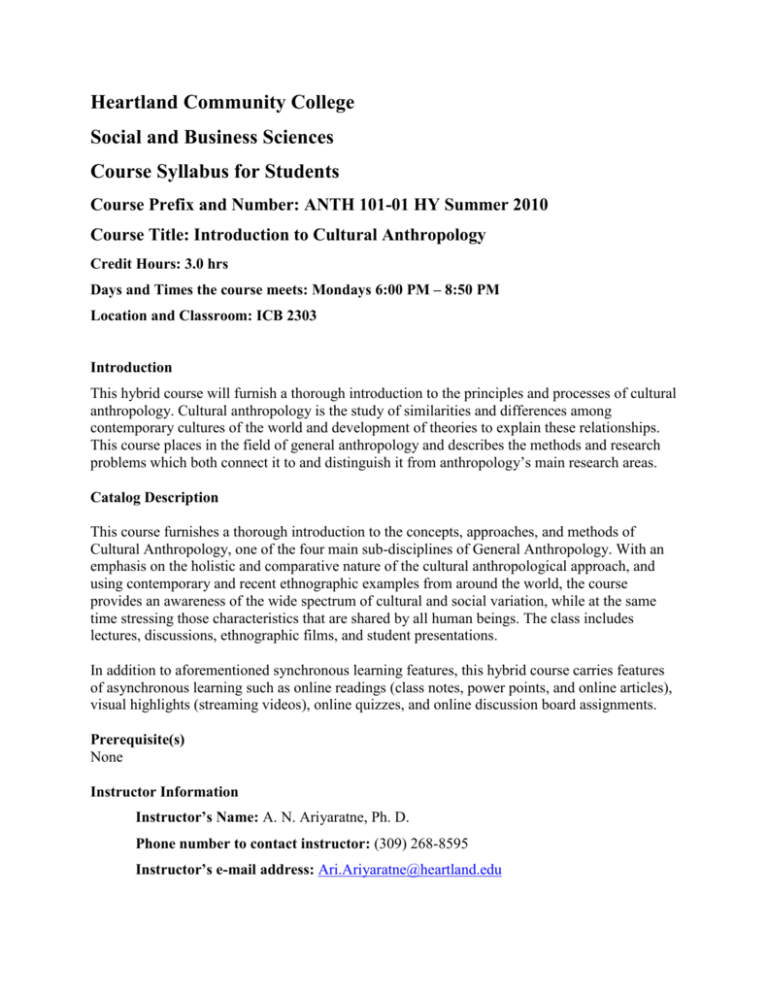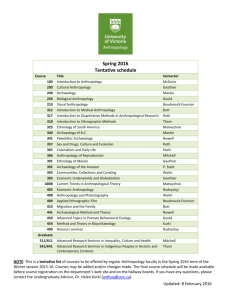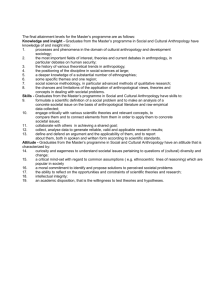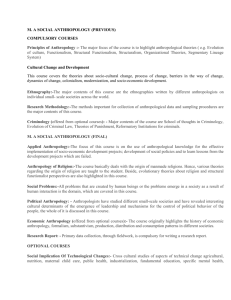ANTH 101 01 Ari SU 10 - Heartland Community College
advertisement

Heartland Community College Social and Business Sciences Course Syllabus for Students Course Prefix and Number: ANTH 101-01 HY Summer 2010 Course Title: Introduction to Cultural Anthropology Credit Hours: 3.0 hrs Days and Times the course meets: Mondays 6:00 PM – 8:50 PM Location and Classroom: ICB 2303 Introduction This hybrid course will furnish a thorough introduction to the principles and processes of cultural anthropology. Cultural anthropology is the study of similarities and differences among contemporary cultures of the world and development of theories to explain these relationships. This course places in the field of general anthropology and describes the methods and research problems which both connect it to and distinguish it from anthropology’s main research areas. Catalog Description This course furnishes a thorough introduction to the concepts, approaches, and methods of Cultural Anthropology, one of the four main sub-disciplines of General Anthropology. With an emphasis on the holistic and comparative nature of the cultural anthropological approach, and using contemporary and recent ethnographic examples from around the world, the course provides an awareness of the wide spectrum of cultural and social variation, while at the same time stressing those characteristics that are shared by all human beings. The class includes lectures, discussions, ethnographic films, and student presentations. In addition to aforementioned synchronous learning features, this hybrid course carries features of asynchronous learning such as online readings (class notes, power points, and online articles), visual highlights (streaming videos), online quizzes, and online discussion board assignments. Prerequisite(s) None Instructor Information Instructor’s Name: A. N. Ariyaratne, Ph. D. Phone number to contact instructor: (309) 268-8595 Instructor’s e-mail address: Ari.Ariyaratne@heartland.edu Instructor’s office hours: Monday 5:00 AM – 6:00 PM or by appointment Textbook Required None Relationship to Academic Development Programs and Transfer This course fulfills 3 of the 9 semester hours of credit in Social Sciences required for the A.A. or A.S. degree. This course should transfer as part of the General Education Core Curriculum described in the Illinois Articulation Initiative to other Illinois colleges and universities participating in the IAI. However, students should consult an academic advisor for transfer information regarding particular institutions. Refer to the IAI web page at www.itransfer.org for more information. Beliefs Academic Discipline: Anthropology is the study of human behavior in all its facets. It is the only contemporary discipline that approaches human questions from historical, biological, linguistic, and cultural perspectives. Each of these sub-disciplines imparts invaluable core knowledge about human beings and their cultural and biological diversity. Cultural anthropology, by employing its analytical tools ethnology, ethno history, and ethnography, explores a variety of human beliefs and behavior while making sense of the meanings that people from different societies ascribe to their experience. Student Learning: Students tend to learn best when presented with a variety of ways to get to know the material. This online course is designed prioritizing student engagement in active learning. Instructor’s Role: The student-centered approach is central to my teaching philosophy. This online course of cultural anthropology is designed with the intention of maximizing student participation in active learning. Moreover, moving beyond traditionally conceived categories of the subject, in this introductory course, I will attempt to give a glimpse of the emerging new theoretical frameworks, methodological transformations, and intellectual currents within the field of cultural anthropology. Course Objectives (Learning Outcomes) At the completion of this course, the students will be able to accomplish the following objectives: 1. By using the type of holistic knowledge which an anthropological perspective brings, the students will be able to view human questions in a broader context when comprehending their interconnections and interdependence. Thus they will be able to see social and cultural relations in global contexts. 2. They will be able to integrate into their own world view a broader understanding of human culture by developing an appreciation for the vast amount of cultural diversity. 3. They will be familiar with a pool of key anthropological concepts and be able to apply them in the process of understanding human condition. 4. 5. They will possess knowledge of the historical developments and contemporary intellectual currents of cultural anthropology. Given the variety of human experiences that the students are exposed to in this course, they will be able to reflect upon their own interests, talents, and goals thus better enabling them to choose appropriate specialized learning environments. Course Outline Module 1: Perspective: Introducing Anthropology and Cultural Anthropology Module 2: Fieldwork: Producing Anthropological Knowledge Module 3: Culture: Distinguishing Human Condition Module 4: Language: Encoding Experience, Structuring Understanding Comprehension, and Engaging Interactively Module 5: Kinship: Organizing Human Symbiosis Module 6: Subsistence: Strategizing Sustenance Module 7: World System: Seeing Systemic Global Connections Module 8: Globalization: Understanding Disorderly Global Processes of Culture Method of Instruction This hybrid course of anthropology is designed by using the online software package in Blackboard 9.0 and by blending online learning features with traditional in class learning activities. Let me briefly explain some features of the course layout. Once you are in this webpage, you’ll see the left column on your computer screen, the column very important for navigating through the course. Notice that there are four blocks of links in the left hand navigation column. The first block is titled as “Course Information.” Click on that, and it will lead you to the syllabus, the document you are reading right now. The syllabus will give you a fairly good idea on course requirements, course work, method of course instructions and evaluation, and course expectations. The second block has three links: “Course Content,” “Course Calendar,” and “Announcements.” When you click on the Course Content link, it will lead you to the content modules of the course and they correspond to the Course Outline given above. There are eight (8) content modules. Each module has all reading materials, video highlights, and PowerPoint presentations assigned for the week, and links to the week’s online quiz and discussion assignments. Each week, the relevant content module will be made available for the students by Monday at 8:00 am. You are required to visit the webpage regularly throughout the semester to browse the relevant module(s), do the required readings, watch the given movie clips, participate in discussion through posting comments, and complete online quizzes. The Course Calendar link will help you to find the important dates and deadlines in relation to your course activities. The Announcements link will help you to find the instructor’s classrelated announcements. The third block should be the tools you need to “do” the homework. You will find “Assessments,” “Discussion Board,” “Email,” “Messages,” and “My Grades” links there. The fourth block should be “Professor’s Profile.” You will find your instructor’s bio-data and contact information there. Now click on “Course Content” in the left hand navigation column, and then click on Module One. You will find the materials you have to study for Module One as the first item. It is titled as “What should I do BEFORE class.” These materials are class notes, power points, online readings, and streaming videos. Each of them is hyperlinked, and by clicking on each heading, you can reach the material. The second item is titled as “What will I learn DURING class?” and it will give you an idea of the themes/topics which are to be discussed during the first class meeting. The third item in Module one is “What should I do AFTER class?” Under this item, you will find information on Weekly Thinking Assignments of Quiz 1, and Discussion Board 1, the assignments you have to complete within the first week. In order to take the quiz, click on “assessments” in the left hand navigation column. Similarly, to complete Discussion Board, click on “Discussion Board.” The third item in the Module is titled as “What can I LEARN MORE in this regard?” Under this item, you will find links with which you can learn more about the topic(s)/theme(s) discussed in the module. You will find this same pattern in all content modules. The weekly online quizzes are designed for one attempt only. Each week, the relevant online quiz will open by Monday at 10:00 a.m. and will remain open until 11:00 pm of Friday. Discussion Board has to be completed no later than Friday at 11:00 pm, every week. In order to get the best results from this online course, it is prudent to follow the instructions given in the relevant content modules in their chronological order. Method of Evaluation (Grading System) You will be evaluated using the following method: Quizzes or Multiple-choice Questions: 2 points x 8 units = 16 Discussion Postings: 1 point x 8 units = 8 Midterm: 35 Final: 35 Participation: 6 For discussion postings, points are given according to laid out expectations: 4 = High level of critical thinking and high proficiency in writing 3 = High level of critical thinking and moderate proficiency in writing 2 = Moderate level of critical thinking and moderate proficiency in writing 1 = Low level of critical thinking and low proficiency in writing 0 = Student did not attempt the assignment When referring to letter grades, definitions, and grade point equivalent, this course follows the guidelines of HCC official grading system given under the HCC Academic Policies of the 2010 HCC Catalog. Incompletes Incompletes are allowed only under the most extreme situations. Students wishing to earn an incomplete grade should see the instructor. Extra Credit None. Student Evaluations In the last 2-3 weeks of class, all students are expected to complete a course evaluation form online, at www.studentevals.com/heartland. Syllabi disclaimer The instructor reserves the right to make alterations to this syllabus as necessary. Course Calendar Week 1 (June 1) Module 1: Perspective: Introducing Anthropology and Cultural Anthropology Week 2 (June 7) Module 2: Fieldwork: Producing Anthropological Knowledge Week 3 (June 14) Unit 3: Culture: Distinguishing Human Condition Week 4 (June 21) Module 4: Language: Encoding Experience, Structuring Comprehension, and Engaging Interactively MIDTERM EXAMINATION (IN CLASS) Week 5 (June 28) Module 5: Kinship: Organizing Human Symbiosis Week 6 (July 5) Module 6: Subsistence: Strategizing Sustenance Week 7 (July 12) Module 7: World System: Seeing Systemic Global Interconnections Week 8 (July 19) Module 8: Globalization: Understanding Disorderly Global Processes of Culture JULY 26 – FINAL EXAMINATION (IN CLASS)







